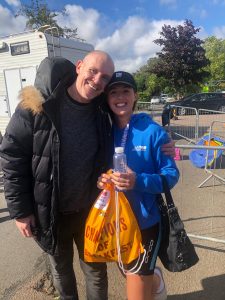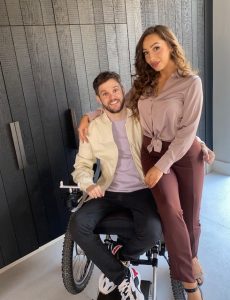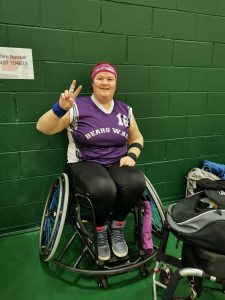Blog
Sharing your personal mountains
Everyday mountains faced by spinal cord injured people is the theme for this year’s Spinal Cord Injury Awareness Day (SCIAD)
We asked our members and the spinal cord injured community to share their everyday mountains with us and the impact these have on their quality of life.
Thank you for taking time to share your stories with us!
Tony, 56, from Solihull
When I try to explain it to people, I compare it to a constant toothache but if it’s something people can’t see, they find it difficult to understand
 What happens when your disability isn’t a visible one? Tony has an incomplete spinal injury at C5/6 after a cycling accident seven years ago. After rehabilitation, he was able to walk again.
What happens when your disability isn’t a visible one? Tony has an incomplete spinal injury at C5/6 after a cycling accident seven years ago. After rehabilitation, he was able to walk again.
But Tony still lives daily with the hidden complications of SCI – fatigue, bladder issues and most acutely, neuropathic pain.
“This pain is so obscure, even the professionals struggle to find solutions,” says Tony. “I was told I would have this for the rest of my life. It is now my constant bed fellow. When I try to explain it to people, I compare it to a constant toothache but if it’s something people can’t see, they find it difficult to understand.
“I’m lucky I can manage my circumstances through part time working and am allowed extra breaks if required. Not all businesses are as compassionate though. We need better awareness around the fact that not all injuries are visible.”
George Dowell, 29, from West Sussex
Trying to book a weekend away or holiday is hard work, with hours of research required to find activities and accommodation we can enjoy together
 Finding accessible things for him and his girlfriend do to together is always a challenge for George Dowell. After being paralysed at C5/C6 following a car accident 12 years ago, George doubted whether he’d ever find love again.
Finding accessible things for him and his girlfriend do to together is always a challenge for George Dowell. After being paralysed at C5/C6 following a car accident 12 years ago, George doubted whether he’d ever find love again.
However, when he and Jessikah Lopez met online, it proved the beginning of something pretty special and the couple now share their journey as an inter-abled couple through their Instagram account thewheellife_ which has thousands of followers.
“Trying to book a weekend away or holiday is hard work, with hours of research required to find activities and accommodation we can enjoy together,” says George.
“Even organising a date night includes lots of prior information to see if the entrance is accessible and if the tables are high enough for George’s wheelchair to fit under,” adds Jessikah, “We can never spontaneously head out for a date night without making sure certain arrangements are in place.
Michelle Quested, 38, from West Midlands
 Phrases like “I’m off for a quick shower” or “just nipping to the loo” were just a part of Michelle’s vocabulary before her spinal cord injury from cauda equina twelve years ago.
Phrases like “I’m off for a quick shower” or “just nipping to the loo” were just a part of Michelle’s vocabulary before her spinal cord injury from cauda equina twelve years ago.
Now a permanent wheelchair user, even the most basic needs require careful planning, preparation – and time.
Michelle did some numbers for us, revealing that showering and getting dressed takes over an hour, intermittent self-catheterising takes around twenty minutes and bowel management can take up to an hour.
“It’s why I need a padded toilet seat!” explains Michelle. “Time and care has to be taken when transferring to the toilet or shower chair to prevent falls and ensure I don’t damage my skin.”
“Catheterising while out is not a problem – I always check before I go somewhere that there are accessible toilets. I carry disinfectant wipes and hand sanitiser to help prevent germs – the last thing I want is a UTI. Bowel management needs to be done at home as it’s time consuming and intimate, but I do always carry gloves and lubricant in case of an emergency!”